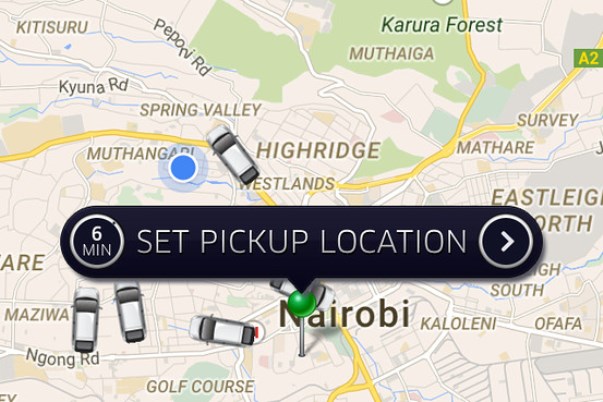Uber is celebrating its impending launch in Accra, Ghana, by providing free rides from June 9 at 12:00 to midnight, June 12. Ghanaians can try out the new service by downloading the Uber application on their mobile phone and entering the promo code MoveGhana. Users are limited to a total of six free rides and each trip is limited to maximum of GHS 20 each. Free rides are only valid for trips that start and end in the Accra in the coverage area.
“Accra is bustling, connected city that Uber is proud to be launching in. It’s rapid growth and multiple ethnic communities make it an exciting place to introduce our service,” says Alon Lits, general manager for Uber Sub-Saharan Africa. “We see Accra as a natural fit, because its people are willing to embrace innovation and technology and love products that are cool, exclusive and offer a new experience.”
Uber launched its mobile ride-hailing application in Africa in August 2013, using Johannesburg, South Africa, as its gateway. The service is now available in cities in Egypt, Kenya, Nigeria, Morocco, Uganda, and South Africa. Dar-es-Salaam, Tanzania, is slated to be next in line after Accra.
Uber’s expansion into Africa has met with protests by local taxi drivers, and in some instances violent attacks against drivers and cars alike. It has also met with robust competition from both local startups and foreign entrants into the market. Rivals contend that their drivers are happier because they have better terms than those offered by Uber, and are better vetted. Bowing to local culture, some allow the prospective customer and driver to haggle over the fare, using the plus and minus signs on the app, until both sides agree on a figure. Others accept payment both in cash and via cellphone, again in a nod to the local custom, where few people have access to a credit card that Uber’s payment system demands. And whereas Uber relies on GPS capability for the most efficient route, local services tout their use of local knowledge to cope with traffic jams.
Below are some of Uber’s rivals in key markets.
Afro. Developed in Nigeria and launched locally in 2012 as Afrocab, this app services is available via an app with Nigerians in mind.
Easy Taxi. Based in Brazil, Easy Taxi operated in Nigeria and Kenya until competition from Uber forced its exit at the end of May. Both are funded by Goldman Sachs.
Oga Taxi. Billing itself as Nigeria’s “first and biggest taxi app,” Oga— “boss” in the local argot—ranks safety as its top priority, offering an SOS feature on the app. The company says it runs extensive background checks on drivers and requires drivers to provide a valid phone number and personal information for identity verification. There is also usually an exchange of personal details (such as names, car plate number and phone number) between the driver and the passenger(s) prior to pick up.
Maramoja. Kenya’s homegrown taxi service app launched a year ago, touting its deep understanding of the local terrain, and an intimate knowledge of Nairobi’s grinding traffic. Maramoja (Kiswahili for “right now”) charges according to zones. The app also tries to tap into users existing networks, recommending drivers through social media favorites via friends or followers.
Mondo Ride. Based in Saudi Arabia, this taxi service has targeted Kenya and Tanzania for its first expansion outside of the Middle East. In adjusting to the local market, Mondo Ride also makes use of “boda bodas,” as local motorcycle taxis are called. They’ve also promised to avoid surge pricing.
RIDE. A potential Uber rival launched in December 2014 in Ethiopia, RIDE is an SMS-based service and uses existing taxi drivers, unlike the private individuals that Uber uses. Prospective customers text their location to 8202, triggering a system check for a registered driver in the same location. Once a driver is found, the system texts them with the customer’s location. If the driver accepts the pick-up, he is given the customer’s mobile number and can call to negotiate the fare.
Taxify. An Estonian service, Taxify launched in Cape Town, South Africa, in April 2016 and in Johannesburg the following month. While its rates are higher than Uber’s, it contends that it beats its rivals by being nice to drivers.













